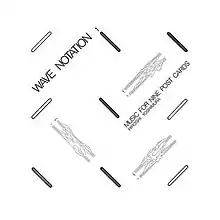| Music For Nine Post Cards | ||||
|---|---|---|---|---|
 | ||||
| Studio album by | ||||
| Released | 1982 | |||
| Recorded | 1982 | |||
| Genre | ||||
| Length | 45:24 | |||
| Label |
| |||
| Producer | ||||
| Hiroshi Yoshimura chronology | ||||
| ||||
Music For Nine Post Cards is the debut studio album by Hiroshi Yoshimura, released by Sound Process in 1982 and rereleased by Empire of Signs in 2017.
Recording and release
The album was home-recorded with a keyboard and Fender Rhodes.[1] In the liner notes Yoshimura stated that he was inspired by “the movements of clouds, the shade of a tree in summertime, the sound of rain, the snow in a town."[1]
Yoshimura originally sent the Hara Museum of Contemporary Art a copy of the album intended to be played in the building but after much interest from visitors the album was then given a wide release as the first instalment in Satoshi Ashikawa’s series “Wave Notation” in Japan.[1] In 2017 the album was reissued by Empire of Signs, the first time outside of Japan.
Reception
| Review scores | |
|---|---|
| Source | Rating |
| Pitchfork | 8.5/10[2] |
| Spectrum Culture | 4/5[3] |
| The Times | |
Upon its rerelease in 2017 the album received critical acclaim. Thea Ballard of Pitchfork wrote that the songs "have a disarming presence, cutting sweetly into the listener’s reality" and that "The effect is multidimensional: melancholy, wistful, invigorating, consoling."[2] Eric D. Bernasek of Spectrum Culture in a positive review, stated that album is "uniformly calm and wistful, evoking the subtly discomfiting melancholy of nostalgia" however criticised the song "Urban Snow" feeling that "The track limits the album’s usefulness as environmental music" by having a spoken word passage in it, and that "its mere presence compromises the purity of the rest by breaking the spell that was cast by the album’s overall restraint and uniformity".[3]
Legacy
In 2018 Crack Magazine selected Music For Nine Post Cards as one of seven essential Japanese ambient albums.[5]
Track listing
All tracks written and produced by Hiroshi Yoshimura.[6]
| No. | Title | Length |
|---|---|---|
| 1. | "Water Copy" | 6:11 |
| 2. | "Clouds" | 5:54 |
| 3. | "Blink" | 4:42 |
| 4. | "Dance Pm" | 6:32 |
| 5. | "Ice Copy" | 2:55 |
| 6. | "Soto Wa Ame - Rain out of Window" | 4:36 |
| 7. | "View From My Window" | 6:15 |
| 8. | "Urban Snow" | 4:45 |
| 9. | "Dream" | 5:34 |
References
- 1 2 3 "Hiroshi Yoshimura: Music for Nine Post Cards". Retrieved 6 October 2019.
- 1 2 "Hiroshi Yoshimura: Music for Nine Postcards". Pitchfork. November 15, 2017. Retrieved 6 October 2019.
- 1 2 "Hiroshi Yoshimura: Music for Nine Post Cards Review". 17 November 2017. Retrieved 6 October 2019.
- ↑ Hodgkinson, Will (January 5, 2018). "Pop review: Hiroshi Yoshimura: Music for Nine Postcards". The Times. Retrieved 20 December 2019. (Subscription required.)
- ↑ "7 essential Japanese ambient and new age records". Retrieved 20 December 2019.
- ↑ "Music for Nine Post Cards". Retrieved 6 October 2019.